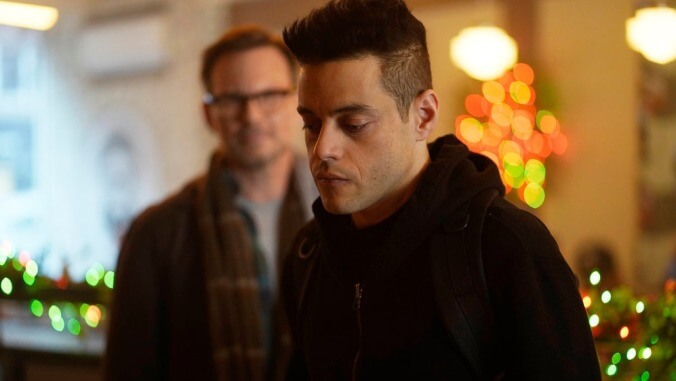Mr. Robot finds Elliot choosing cruelty in the name of vengeance


Every regime that tortures does so in the name of salvation, some superior
goal, some promise of paradise. Call it communism, call it the free market,
call it the free world, call it the national interest, call it fascism, call it the
leader, call it civilization, call it the service of God, call it what you will, the cost of paradise…will always be hell for at least one person somewhere,
sometime.—Ariel Dorfman, The Tyranny Of Terror
The question of moral boundaries is one of the most fertile in all of philosophy. Does the greater good justify smaller acts of evil? Do we legitimize cruelty when we utilize it for nobler purposes? Just how bad is it for us to do something wrong once, if we swear to never do it again? Moving goalposts is a common refrain in ethics (general bullet point: If you do something bad and justify it to yourself, you’ll probably do it again), but more interesting is the emotional and moral toll it takes. If someone tortures a bomber to get the location of the bomb they planted, and it works (it doesn’t, but hey, this is the realm of ideas), then the only possible acceptable response to that person’s act is the assumption that they will live with the guilt they accrued—that an evil act is never washed away because of its salutary effects. It should generate ceaseless dread. Or as Mr. Robot puts it when assessing the results of Elliot’s horrific blackmail of a good person, “Maybe that dread is a good thing.”
“Not Acceptable” leans hard into its title, with each storyline interrogating the consequences of difficult choices made with the full awareness they would hurt someone innocent. Fernando Vera takes Krysta hostage, eventually bullying her into cooperating with his plan to force Elliot into collaboration; Dom holds Darlene at gunpoint, her need to protect her family finally running up against the brutal expectations of the Dark Army; and Elliot does the morally repugnant thing we all hoped he wouldn’t have to do, taking the sweet and damaged woman he recently connected with and blackmailing her into doing his bidding, to the point she almost kills herself. Fun, this is not.
What makes it gripping is the same thing that makes it frustrating: We are barreling towards the endgame of the show, but there’s so much going on, it feels like a disservice to these characters and stories to rush through them so quickly, even if it quickens the pulse. Vera is the most obvious case: It’s hard to see him as anything but a roadblock to the actual story, an obnoxious interlocutor (no mater how poetically he speaks) dragging us away from the eventual showdown with Whiterose and the Deus group. He was in, what, three episodes the first season? So to suddenly have him arrive as a major player this year, one with whom we’re spending an awful lot of time, comes across as a distraction. Sure, there’s the chance he’ll play a major role in the final confrontation, but nothing thus far indicates that will be the case. He’s just a shitty drug dealer with delusions of grandeur. When Elliot gets thrown in the car trunk at the end of the episode, his plans to rescue Krysta in tatters, it’s not a case of got-the-drop-on-you excitement; it’s a question of whether this will have anything to do with anything.
The toughest narrative this week is watching Elliot blackmail Olivia. It’s an ugly choice, one we watch Elliot grapple with before committing to it, and overall, it offers some of the darkest material of the season. This show is at its best when it deals honestly with the messy give-and-take of capitalist exchange, and here, both Elliot and Olivia get in their digs. He calls out the sympatico nature of big-money employment: “You chose to look the other way,” he tells her of Cyprus National Bank and the Deus Group, and he’s not wrong. That’s exactly how capitalism successfully penetrates every realm of society. But her point is equally strong—that he’s participating in the same skewed value system that he wants to bring down. It hearkens back to the first season, much as we’ve been doing throughout season four, as it mirrors and magnifies that initial story, with Elliot’s cruelty recalling his treatment of poor, innocent Bill Harper during the Steel Mountain hack in episode five.
The only weakness is just that the episode wimps out before really digging into these thorny questions with which so many of us grapple. Olivia saying, “I work for monsters…but you are one,” and claiming he’s worse for not knowing it, is a reductive accusation for which Elliot would have a ready retort. (“I am a monster” wouldn’t have been shocking to hear, but there are plenty of options.) Sam Esmail is giving too easy an out there for this debate, which deserves better. Yes, she’s right; but she’s also missing the mark, and Elliot would be the first to call that out. The show is smarter than this. It’s not that any excuse would justify his actions; it’s that the characters involved wouldn’t let such generalizations sum up the state of affairs.
Dom and Darlene, for example, don’t let each other get away with anything, no matter how it may hurt them. There are two reasons for this subplot being the richest of the night: One, because these characters would never allow either to get in the last word if it felt wrong, and two, because they have one hell of an intriguing villain in Janice. The Dark Army’s latest servant has all the hallmarks of a compelling nemesis, but unlike Irving last season, we’re obviously not going to spend enough time with her to bring out the three-dimensional fullness of her character. She’s a threat with a quirky pastime, a Bond villain who needs more unpacking. USA execs talked a lot when Mr. Robot first began about how Esmail came in with five seasons of story ready to shoot; this is the first time the last season has felt like it’s trying to do double duty, telling two years’ worth of story in one go.
Luckily, Carly Chaikin and Grace Gummer are up to the task. Dom and Darlene have the most fraught history of any of these character pairings, and the life-or-death scenario they face here gives them a chance to confront not just their own actions, but their unresolved connection to one another. It’s awkward and tense and romantically charged all at once, and the two actors make the most of it. Dom and Darlene have both been essentially lost this season, flailing without a sense of hope (though Darlene got some affirmation last week that her brother is still there for her, and he apologizes for his prior awfulness here), so finding renewed purpose through each other is an inspired way to push them both towards action.
If only Vera weren’t monologuing about his history as a “little bitch” who not only beat down his bully, but earned undying loyalty for doing so, we could be rushing towards the Deus group right now. Instead, Elliot’s locked in a trunk and being delivered to the guy who caused him so much pain, so long ago. (Well, a long time for us, but only so many months ago for Elliot, so he’s presumably still pretty raw about it.) Whiterose tells her assistant to stop pushing for Elliot’s death, and it isn’t just because he is through waiting for his project to be complete. “It’s time he learns we’re on the same side.” Whiterose once made the same case to Angela, and it transformed her. Elliot might not be so quickly convinced; but before that, we’ve got some unfinished business: #JusticeForShayla.
Stray observations
- It’s been fascinating to watch the roles invert as Mr. Robot addresses us this season. The past few episodes have offered repeated times that it would make sense to re-engage with Elliot ourselves, but Robot keeps communicating instead. Still, one major development tonight: Right before Elliot closes the door to Olivia’s apartment, he looks right at us.
- Leon pops by to let Elliot know he’s gone “full time freelance,” and is available should our troubled hacker need help. Call it Chekov’s assassin: Put a Leon on the shelf in Act One…
- Janice is listening to a radio program about “a guy who continually talks to someone who isn’t there,” referencing Matthias, the Biblical prophet and disciple chosen to replace Judas Iscariot after his betrayal of Jesus.
- Speaking of which, it can’t be coincidence that when Vera is holding court in Krysta’s kitchen, her island is set up in front of him to look an awful lot like the last supper.
- My favorite Elliot/Olivia exchange of the night: “I’m sorry.” “I don’t believe you.”